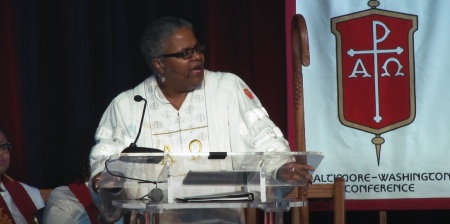Md. judge rules against 37 churches suing UMC over property dispute

A Maryland judge has ruled against 37 churches that sued a regional body of The United Methodist Church, claiming that the rules for allowing them to depart the denomination were unfair.
Judge Michael Malone of the Circuit Court for Anne Arundel County issued an order and opinion last Friday siding with the UMC Baltimore-Washington Conference in the disaffiliation process dispute.
Malone upheld the Conference's claim that the denomination had “an irrevocable trust” over the properties of the UMC, including the church buildings belonging to congregations seeking disaffiliation.
“Maryland law provides that trust is presumed irrevocable unless ‘the power to revoke has been reserved,’” wrote Malone. “And there is no language in the trust clauses in the Discipline reserving the right to revoke. Thus, the trust created is irrevocable.”
“Defendants in this case are entitled to summary judgment on this claim, as the local churches consented to the authority of the denomination, and the local church properties are merely held by the churches, in trust, for the UMC.”
Bishop LaTrelle Miller Easterling, head of the UMC Baltimore-Washington Conference, said in a statement emailed to The Christian Post that she was “grateful to have this matter resolved.”
“With such critical needs facing our communities as food insecurity, addiction recovery, access to affordable health care, etc., our focus should be on mission and ministry. It is my prayer that everyone will turn their attention to these Christ-centered needs,” stated Easterling.
The bishop also said she believed it was “important to note that this decision rightly upholds the United Methodist Trust Clause and the agency of annual conference trustees.”
Regarding the decision, one of the plaintiffs in the case, who asked to remain anonymous, emailed CP a statement expressing disappointment with the order and accusing the Conference of “financial malfeasance, greed, and unjust harm toward the local congregations.”
“Most of, if not all, the local congregations in this case have never received any financial support from the Baltimore-Washington Conference and have built and maintained their properties from the sacrificial giving of their congregants,” he stated.
“And yet the Conference chooses to act akin to Pharaoh in the book of Exodus and the scribes whom Christ Himself speaks of in Luke 20:45-47. While this decision from Judge Malone, who himself is a United Methodist layperson and opted not to recuse himself from this case, is a bit of a momentum killer, we will consult our legal counsel to discern what our next steps might be.”
The plaintiff also stated that he is still “hopeful that either this decision is appealable and will eventually be overturned or, far more preferable, that the Conference's conscience would be stirred and they would choose the path of holy and humble repentance.”
For decades, the UMC was embroiled in a divisive debate over whether to amend their Book of Discipline to allow for the blessing of same-sex unions and the ordination of individuals in homosexual relationships.
Although efforts to change the rules had always failed, progressive leaders within the UMC often refused to follow or enforce the Book of Discipline, leading many conservatives to leave the denomination.
In 2019, at a special session of the UMC General Conference, delegates voted to add a temporary measure to the Book of Discipline that allowed churches to leave the UMC due to the ongoing debate.
From 2019 to when the measure expired at the end of 2023, approximately 7,500 mostly conservative churches left the UMC. Earlier this year at General Conference, delegates overwhelmingly voted to allow same-sex marriage and the ordination of openly-gay clergy.
In March of last year, while the temporary dismissal process was still in effect, the congregations sued the Conference, arguing that the regional body’s implementation of the process was unfair to them.





















